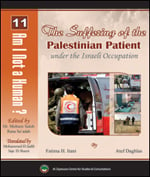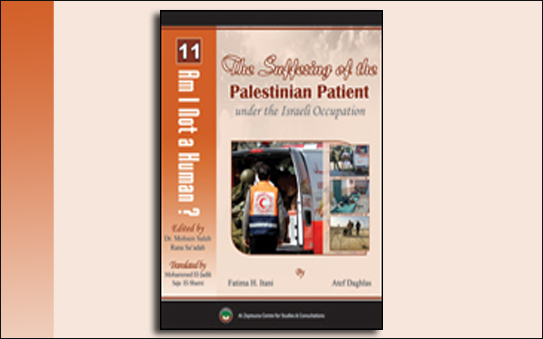Description
The Suffering of the Palestinian Patient under the Israeli Occupation is the new book published by Al-Zaytouna Center for Studies and Consultations in Beirut. The book addresses the suffering of the Palestinian patients and the Palestinian health sector due to Israeli violations. These include the vast difference in health care between the Jews and Arabs, the experimentations done on Arab patients, the repercussions of the siege on the Gazan patients in addition to the influence of the Israeli checkpoints and the separation wall on the patients in the West Bank, the suffering of the patients held in the Israeli jails and the deliberate targeting of medical personnel.
 English
English
Title: The Suffering of the Palestinian Patient under the Israeli Occupation
Prepared by: Fatima ‘Itani and Atef Daghlas
Edited by: Prof. Dr. Mohsen Mohammad Saleh and Rana Sa‘adah
Published in: 2012 (1st Edition)
Physical details: 128 pages, 17*21 cm, paperback
Price: 4 $
The book, prepared by Fatima ‘Itani and ‘Atef Daghlas and edited by Prof. Dr. Mohsen Mohammad Saleh and Rana Sa‘adah, is 128 pages of medium size. It is the 11th in the Am I Not Human? series, which endeavors to present a full and complete picture of the suffering of Palestinians under Israeli occupation . It tries its best to address the hearts and minds with the most accurate, concrete and documented framework.
The book cites many cases of patients whose suffering is exacerbated by Israeli obstacles and the difficult conditions of Palestinian health care institutions. The book also addressees the delays at the Israeli checkpoints and the gates of the Separation Wall in addition to impeding the access of patients and pregnant women to health care centers. The number of patients who died at the checkpoints has amounted to 401 since the outburst of the Intifadah and till 31/1/2011. On another hand, the book highlights the deterioration of health care sector in the Gaza Strip as a result of the Israeli siege which was imposed since mid 2007. It led to a serious shortage of medicine,medical instruments other necessary requirements for hospitals and even ambulances. These conditions caused the death of 380 Palestinians.
The book also includes comparative statistics which illustrate the gap’s magnitude between health care offered to Jews and Palestinians. It mentioned that, in 2008, the average per capita allocations of health resources was $ 2,145 in Israel compared to $165,5 in the Palestinian Authority Territories, while the number of beds in 2009 reached 42,119 beds in Israeli hospitals compared to 5,058 beds in Palestinian hospitals.
The book sheds light on the experimentations performed on Palestinian patients in the Israeli hospitals including children, old and mentally ill patients without their own or their legal custodians’ permission. It reveals the testing of serious drugs on the Palestinians prisoners and the illegal trade of Palestinian human organs from corpses to treat Israeli patients, including soldiers. This conduct fails to respect international covenants which regulate medical experimentations on patients.
In addition, the book tackles the Israeli policy of deliberate medical neglect regarding the prisoners and preventing them from getting proper medical care. These conditions increased in the number of sick prisoners and exacerbated their diseases, even after their release. Consequently, and since 1967, over 51 Palestinian prisoners died in the Israeli prisons.
The Israeli policy of preventing patients from traveling abroad to get treatment was also discussed in the book. For Israel has the tendency to impose conditions of collaboration with the Israeli authorities and revealing information about their wanted relatives or neighbors in order to get proper treatment in Israel.
The frequent Israeli attacks on Palestinian medical personnel were also exposed. The personnel are fired at, physically and verbally abused, and obstructed from reaching patients or even the injured. During Israeli military operations ambulances and medical facilities are always targeted.








Reviews
There are no reviews yet.